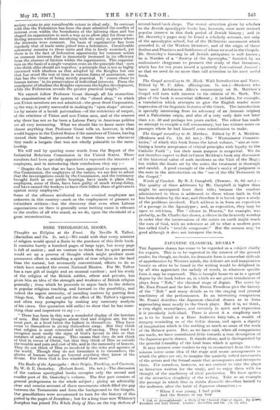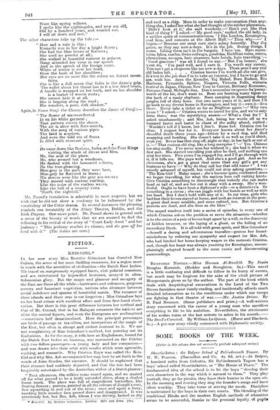JAPANESE. CLASSICAL DRAMA •
THE Japanese drama has come to be regarded as a subject chiefly for experts. This is to be-regretted in the interest of the general reader, for though, no doubt, its dramatic form is somewhat difficult of apprehension by Western minds, the delicate art and imaginative beauty so often to be found in the writing would be delighted in by all who appreciate the melody of words, in whatever specific form it may be expressed. This is brought home to us in a special degree by the book before us, in which we are given translations of plays from " Nob," the classical stage of Japan. The notes by Mr. Ezra Pound and the late Mr. Ernest Fenollosa give the history of the " Noh " and many details as to the staging and general machinery of the performances. In an interesting comparison Mr. Pound describes the Japanese classical drama as in form approaching most nearly to the Greek plays. But it is, we think, a very slight resemblance, and certainly in spirit and expression it is peculiarly individual. There is about it a simplicity such as is to be found in a Hans Andersen fairy-tale, a wealth of imagery reminding us of the Celtic drama, and again a dignity of imagination which is like nothing so much as some of the work of the Hebrew poets. But, as we have said, when all comparisons are made, we have contributed little towards a true description of the Japanese poetic drama. It stands alone, and is distinguished by the graceful formality of the land from which it springs.
It may interest some readers to try to reconstruct from the volu- minous notes some idea of the stage and scenic arrangements in which the plays are set, to imagine the quaintly stilted movements of the actors and the formal music that accompanies and interprets them. For ourselves, however, wo are content to take the plays as literature written for the study, and to enjoy them with no thought of the machinery of their production. Wo have spoken of the attractive simplicity of the writing. Take as an example the passage in which One in Sotoba Romaniri describes herself to the audience, after the habit of Japanese characters :—
" When I was young, I had pride And the flowers in my hair
• Noh, or Aerompliehment: a .Study of the elate rat Stage of Japan. By Ersee: Fenollosa and Ezra round. London : Macmillan and Co. 17a. ad. net.]
Were like -spring willows. I spoke like the nightingales, and now am old, Old by a hundred years, and wearied out. I will sit down and rest."
The other characters take up the tale :— " How sad -a ruin is this : :Komaahi was in hor day a bright flower ; She had the blue brows of Katsura ; She used no powder at all ; She walked in beautiful raiment in palaces.
Many 'attended .her verse in our speech And in the speech of the foreign court. White of winter is over her head, -Over -the husk of her shoulders ; Her oyes are no more like the colour on distant moun- tains, She is like a dull moon that fades in the dawn's grip.
The wallet about her throat has in it a few dried beans, A bundle is wrapped on her back, and on her shoulder is a basket of woven roots ; She cannot bide it at all.
She is begging along the road ; She wanders, a poor, daft shadow."
Again, in ,Sines Genii the Chorus describes the dance of •Genji :- " The flower of wawa-reflected Is on his white garment ; That pattern covers the sleeve. The air is alive with flute-sound% With the song of various pipes The land is a-quiver, And even-the wild sea of Sums Is filled with resonant quiet.
He came down like Brahma, Inclra, and the Four Kings visiting the abode of Doves and Men.
He, :the soul of the place.
Ho, who -seemed but a woodman, He -flashed with the honoured colours, He the true,glearning.
Blue-grey is the garb they wear hero, Blue-grey -he fluttered in Suma ; His sleeves wore like the grey sea-waves ; They 'moved with curious rustling, Like the -noise of the restless waves, Like the bell of a country town 'Noath the nightfall."
Mr. Pound's translation is admirable in most respects, but we wish that he did not show a tendency to be influenced by the vocabulary of the Celtic drama. In several instances the phrasing reminds one irresistibly of the Abbey Theatre, Dublin, and the Irish Players. One more point. Mr. Pound shows in general such a sense of the beauty of words that we are amazed to find the following in his recital of the story of " Court Lady Awoi " and her jealousy : " This jealousy reaches its climax, and she goes off her head with it." (The italics are ours.)



























 Previous page
Previous page